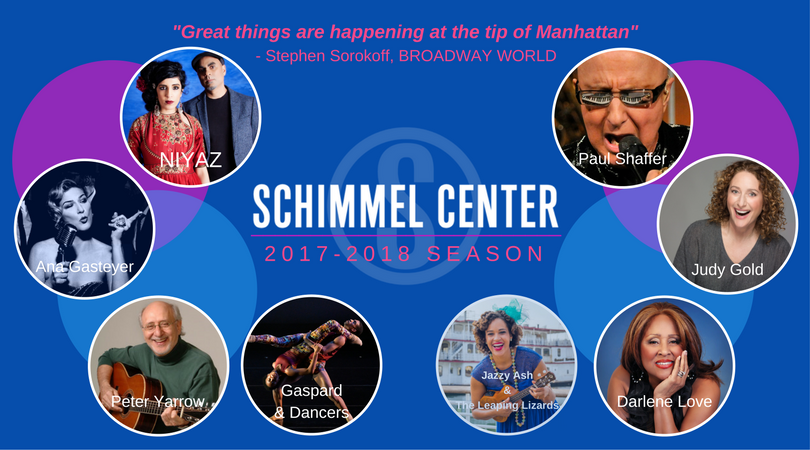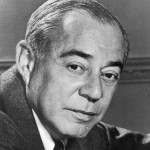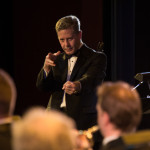The Sound of Music: Inside American Showstoppers, An Evening with Richard Rodgers
When the name Richard Rodgers is heard, one cannot help but instantly team him up with his most famous writing partner, Oscar Hammerstein II. In 1943, the team formed a dynamic duo that most historians agree, changed the course of the American musical. On one fateful March evening an audience assembled at the St. James theatre and heard the opening chorus that forever changed the way we look at musical comedy, “There’s a bright golden haze on the meadow….” There certainly was a bright golden haze over the future of the great white way. Oklahoma! was odd and exciting because it was the first time that the score of a musical comedy was so successful at both furthering the plot of the piece as well as creating character development. The success of the “first mature book musical”, Oklahoma! paved the way for a golden era in American musical comedy history. The team would go on to write more classics including Carousel, The King and I, South Pacific and of course, The Sound of Music. If these five classic and much beloved musicals had been his only legacy, it would have been a fantastic one. But Richard Rodgers’ story did not begin or end with Oscar Hammerstein II. His legacy is a much greater and more vibrant one.
A New York native, Rodgers was greatly influenced by the operettas his parents brought him to in Manhattan as a young child. He started playing piano at the age of six and was composing songs for his friends and family by his teenage years. With his love for the musical stage, the young composer would pursue an education at the prestigious New York institutions, Columbia and, the soon to be renamed Julliard school of music. It was at Columbia that Rodgers would meet his first great musical partner, Lorenz Hart. The two green songwriters wrote songs for musical reviews. The songs, though sophomoric, were a kin to those being developed in “tin-pan alley”. Their song writing seemed to be going nowhere and Rodgers almost gave up to pursue a “sensible” career in retail when the duo was asked by The Theatre Guild to compose new music for a one night benefit show. The songs hit a chord with their esteemed audience and their first contribution to the Great American Songbook of standards “Manhattan,” was introduced.
Together the duo wrote a slew of shows that were considered “hits”. A Connecticut Yankee, The Boys from Syracuse, Pal Joey, By Jupiter and Babes In Arms are all classics that are still performed today around the country in high school, stock and regional theatres. The shows are recognizable but somehow not as recognizable as the unforgettable songs the shows supplied. “My Funny Valentine”, “Blue Moon”, “Bewitched, Bothered and Bewildered” and “The Lady is a Tramp” are all regarded as American Songbook classics and have all been recorded by the likes of Ella Fitzgerald, Dean Martin and Frank Sinatra. While Rodger’s later collaborations with Hammerstein were meant to further a plot, the songs written with Hart were written to be hits. The plots that revolved around these gloriously fun and exuberant musical numbers were rather flimsy and were written as a vehicle to showcase the fabulous music. By the sheer nature of these songs, they can fit into many different situations and settings. The songs written by Hart have become more universal and still live on today, well beyond the shows they were written for. Lady Gaga has even covered “The Lady is a Tramp,” I’m sure many listeners never even knew it was from an old chestnut titled Babes in Arms!
Another major difference between the songs written with Hart and the songs written with Hammerstein is tone. Many critics agree that the reason Rodgers and Hart’s collaborations were so sophisticated was due to dichotomy between Rodger’s upbeat melodies and Hart’s pessimistic lyrics. In one of the most famous love ballads, “Funny Valentine,” Hart wrote the words, “Your looks are laughable, unphotographable”. Even when writing about love, Hart would refuse to be “sappy”. Hammerstein, on the other hand, wrote lyrics that beamed with optimism. In South Pacific, a musical about racism and World War II, he still managed to fit in lyrics like, “When the sky is a bright canary yellow, I forget every cloud I’ve ever seen.” Hart may have been a master of the melancholy lyric and it certainly came from a dark place. Eventually his fight with alcoholism, drug addiction and repressed homosexuality in a pre-enlightened world would take a toll on both Hart’s personal life and his professional career with Rodgers. By the early 1940’s, it became clear to Richard Rodgers that he should begin searching for a new writing partner.
In 1942, Richard Rodgers was brought together with Oscar Hammerstien II by the Theatre Guild who was looking for a team to write a musicalization of the play Green Grow the Lilacs by Lynn Riggs, which had been produced by the Guild ten years earlier. Together the team became the kings of Broadway. Not only did they write the greatest hits of the upcoming decade, they also formed a production company that would produce Broadway hits like Irving Berlin’s Annie Get Your Gun. The two were sought after by Hollywood to score the 20th Century Fox musical remake of State Fair and were contracted by CBS to write a musical version of the classic fairy tale, Cinderella. The later was recently given its first ever Broadway staging this past March and is still running at The Broadway Theatre on 53rd Street. Together the songwriting duo won 35 Tony awards, 15 Academy awards, two Pulitzer Prizes, two Grammy Awards and two Emmy Awards. Sadly, in 1960 their partnership ended after Hammerstein’s death to pancreatic cancer. The death came only 9 months after the Broadway premier of their greatest hit, “The Sound of Music”. Hammerstein’s last lyrics were to the song, “Edelweiss”.
Not to be discouraged by the death of his great writing partner, Richard Rodgers set out to write his first musical as both composer and lyricist. No Strings, may not have been Rodgers’ most commercially successful endeavor but it was regarded as a modest hit and won him two Tony awards and featured the beautifully haunting song “The Sweetest Sounds”. Rodgers would end his career with collaborations with Martin Charnin (of Annie fame), Sheldon Harnick (of Fiddler on the Roof Fame), and one of the most celebrated songwriters of all time, Stephen Sondheim. None of these outings were commercially successful but Rodgers was happy to be collaborating with such fine lyricists.
In 1979, at the age of 77 Richard Rodgers left the world behind with an extraordinary legacy. His music from all three eras of his career had left a mark on a burgeoning generation of new musical theatre composers. Among these composers are his daughter Mary Rodgers who brought us the classic Carol Burnett, fairy tale vehicle, Once Upon A Mattress and his grandson, Adam Guettel who won the praise of critics with his score to The Light in the Piazza.
Pace Presents is excited to welcome back Fred Barton to lead his orchestra and stellar cast of all-star Broadway performers to bring to life the music of Richard Rodger’s career. With his witty mix of anecdotes about the composer and his fine orchestrations of these classic pieces this promises to be an evening not to be missed. Come on down to the Schimmel Center and celebrate the life and music of this great composer. They are sure to be “the sweetest sounds you’ll ever hear.”
American Showstoppers: An Evening With Richard Rodgers/Saturday, October 12/ 7:30pm/ $45/$35/$25/ Student Tickets: $5
See You at the Schimmel!
Michael Torbet, 2013-14 Pace Presents Blogger
For tickets visit schimmel.pace.edu or call the box office at (212) 346-1715



